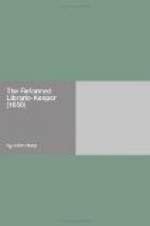Hugh Trevor-Roper has called Hartlib, Dury, and Comenius “the real philosophers, the only philosophers, of the English Revolution."[3] They combined a long list of practical plans with an overall vision of how these fitted into the needed antecedent events to the millennium. They made proposals for improving and reforming many aspects of human activities and human institutions. The advancement of knowledge, the improvement of human life, and the purification of religion, which included bringing the Jews and Christians together, would prepare England for its role when God chose to transform human history. In a long series of pamphlets and tracts, Hartlib and Dury turned Comenius’s theory into practical applications to the situation then prevailing in England.[4]
Dury outlined this program in a sermon he gave before Parliament on 26 November 1645 entitled Israels Call to March Out of Babylon unto Jerusalem. He pointed out that England, the new Israel, had a special role in history, “for the Nations of great Britain have made a new thing in the world; a thing which hath not been done by any Nation in the world, since the preaching of the Gospel in it, a thing which since the Jewish Nation, in the daies of Nehemiah, was never heard of in any Nation, that not only the Rulers, but the whole multitude of the people should enter into a Covenant with their God, ... to walk in the waies of his Word, to maintain the Cause of Religion, and to reform themselves according to his will” (pp. 23-24).
Since England was to be God’s agent in history, Dury proclaimed at the end of his sermon that “The Schooles of the Prophets, the Universities[,] must be setled, purged and reformed with wholsom constitutions, for the education of the sonnes of the Prophets, and the government of their lives and with the soundnes and purity of spirituall learning, that they may speak the true language of Canaan, and that the gibberidge of Scholastical Divinity may be banished out of their society” (p. 48).
In the same year that he delivered this sermon, Dury married an aunt of Lady Catherine Ranelagh and was brought in closer contact with Lady Catherine’s brother, Robert Boyle, and the young scientists of the so-called Invisible College. Dury and Hartlib pressed for reforms that would promote a better, more useful education from the lowest grades upward. Convinced by the passage in Daniel 12:4 that knowledge shall increase before the end of history, Dury and Hartlib sought various opportunities to bring about this increase in knowledge through better schools, better religious training, and better organization of knowledge. Such organization would necessarily affect libraries since they were an all-important component of the premillennial preparation.




